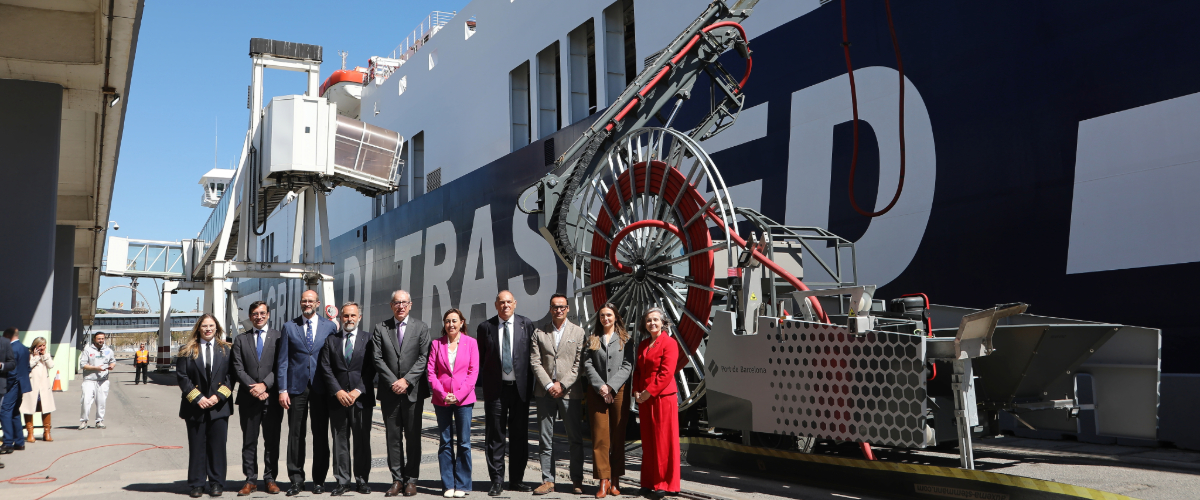Shore power for Trasmed ferries at the Grimaldi terminal in Barcelona
The first
Onshore Power Supply (OPS) system for ferries at the Port of Barcelona is
located at the Grimaldi terminal, specifically at the Sant Bertran dock. Its
entry into operation marks a milestone in the transformation of both the port
and the city towards a greener future. In fact, the OPS can provide electricity
24/7 from 100% renewable sources to ferries linking the Catalan capital with
the Balearic Islands and equipped with an HV Shore Connection. This allows them
to shut down their engines and eliminate emissions and noise while docked.
The OPS
installation is part of Nexigen, an ambitious €200 million plan for the
electrification of the Port of Barcelona's docks. The OPS was implemented in
coordination with Grimaldi Logística España, ensuring that the various systems
were designed to be compatible with the terminal's daily operations. It
combines a fixed installation, which adapts the frequency and voltage of the
electrical current to the specific needs of each vessel, with a mobile system
that enables connection without interfering with dock operations.
In
parallel, the Grimaldi Group’s Spanish shipping company Trasmed has invested in
making its ships compatible with the OPS. The system was inaugurated at the end
of March by the ferry Ciudad de Palma. A retrofit has also been
completed for the Ciudad de Sóller and is now awaiting imminent
commissioning to verify the correct operation and compatibility of the
connection system with the onshore facility.
From late
2025, adaptation work is planned to enable connection to the onshore power grid
for the other two ferries operated by Trasmed, the Ciudad de Granada and
Ciudad de Barcelona. In other words, all Trasmed ships will soon be able
to turn off their auxiliary engines while docked and operate entirely on
electricity supplied by ports equipped with OPS.
For the
time being, the new system allows the connection of only one ship at the Sant
Bertran dock, but the installation has been designed to be easily expandable,
enabling the simultaneous connection of two vessels at the two berthing points.
The ability to connect both ships operating on the Barcelona-Palma de Mallorca
route daily will amplify the positive impact of the new system. By shutting
down their engines while moored at the Port of Barcelona, these ferries will
avoid emitting an average of 6.14 metric tons of CO2 per stopover,
amounting to an annual reduction of 2,090 metric tons of CO2.
Given the
significance of this innovation at the Port of Barcelona, it is no surprise
that numerous stakeholders, including representatives from various public and
private entities, participated in the inauguration event on 31 March. "It’s
essential to understand the complexity of major infrastructure projects in the
energy transition, in terms of both scale and the involvement of multiple
actors," stated the Minister of Territory of Catalonia, Silvia
Paneque."The Port of Barcelona deserves credit for its strategy,
effort and commitment in developing the Energy Transition Plan, with the goal
of becoming a zero-carbon-emission port by 2050 and a hub for the production
and distribution of green energy."
"This
OPS is particularly important because it’s located in the terminal closest to
the city," emphasized the President of the Port of Barcelona, José
Alberto Carbonell. "When we talk about decarbonizing port
activities, we do so not only with the climate emergency in mind but also, and above
all, thinking about the quality of life of the people who live around us. Today
marks a major step in this direction, but it won’t be the last. The OPS at
Grimaldi Terminal Barcelona allows us to continue with the Nexigen plan to
improve air quality in the local area and make port activities more
sustainable."
This goal
is now closer thanks to the commitment of the Grimaldi Group, which, as
highlighted by Mario Massarotti, is currently the only company in the
Port of Barcelona capable of operating in this terminal with zero emissions.
"All Grimaldi Lines vessels operating between Italy and Spain have been
equipped with batteries for several years and operate with zero emissions in
ports," recalled the Managing Director of Grimaldi Logística España.
"The same commitment is shared by Trasmed, the Group's company operating
in the Balearic market, which has invested over €1.2 million to adapt its ships
to the OPS system."
Ultimately,
as underlined by Pedro García Navarro, Director of Operations at Puertos
del Estado, the success of this initiative at the Port of Barcelona is "the
result of collaboration between the public and private sectors, […] a
significant step for the national port system," and "a model
for ports, transport chains, and Spain's energy transition."


